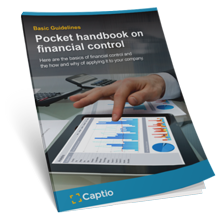The financial controller is the professional responsible for the company’s financial control, his/her position in the company being linked to control and supervision and thus providing a bridge between management and accounting. This post’s functions vary significantly depending on whether the company is a single company or a subsidiary or whether it is a parent organization of a company of a certain size.
The financial controller of a medium-sized company or subsidiary
In a company of these characteristics, the financial controller’s functions are basically operational, the main and most common being:
-
 Contribution at a basic level to the supervision of the preparation of the annual accounts of the company.
Contribution at a basic level to the supervision of the preparation of the annual accounts of the company. -
Guaranteeing compliance with both accounting and tax obligations.
-
Verification of compliance with tax objectives and the organization's standards and procedures.
-
Detection of errors, deviations and areas for improvementfrom a financial perspective.
-
Implementation of methodological and IT tools to control activity.
-
Optimizationof information systems.
-
Treasury management and supervision of the level of funds needed for common costs and investments.
-
Training and motivationof the financial and accounting teams under his/her responsibility.
-
Sending of reportsto the Senior Management of the company, subsidiary or, if applicable, Financial Director of the central or parent company.
-
Occasionally being responsible for maintainingthe relationship with the external auditors and responding to their demands.
>> Do you want to be able to design an effective financial control system for your company? Discover how do it in this free pocket handbook <<
Functions in the central company
The role of financial controller is significantly modified in the case of large companies with a parent company and various subsidiaries. In the event that this professional controls the central company, his/her role will be less operational and more focused on such issues as:
-
The supervision of the preparation of the individual and consolidated annual accounts as well as the financial statements of the whole Group.
-
Development and implementation of internal control.
-
Definition of thestandards and procedures of the whole company.
-
Organization and analysis of thereporting system.
-
Coordination of the Group or organization’s transversal projects, which may relate to strategy, IT, finance or accounting.
-
Control of the company’s overall financial objectives: budgets, investments, funding, etc.
-
Participation in thedefinition of the company’s general business plan.
The job specification for this post includes higher education in Economics and/or Business Studies or an equivalent qualification, experience in audit or a control department dealing with financial, industrial or sales management being highly desirable. These professionals almost always finish their university education with an MBA or postgraduate degree in Financial Management.





